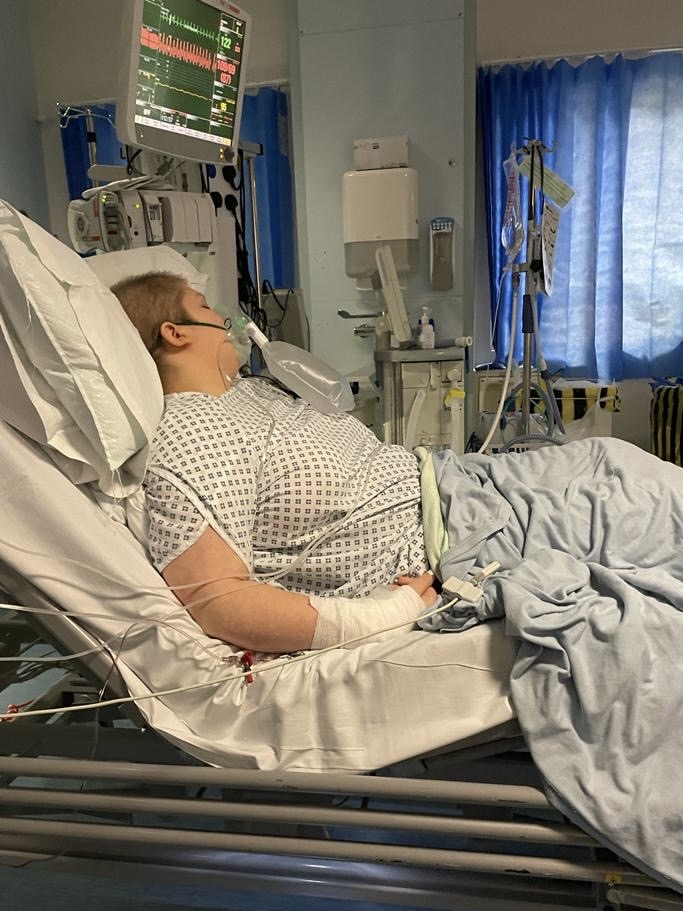Skin cancer and body image
Laura
Cancer sometimes changes the way your body looks, functions and feels – and that can change how others react to you, and how you feel about yourself. Here, Laura reflects on her experience of recovering from skin cancer.
I’m Laura, and I was diagnosed with skin cancer aged 24. I had multiple biopsies, and plastic surgery to remove a large area of skin on my knee and lymph nodes from my groin area. This left me with a large 30 cm scar across my knee and a 10cm scar in my groin. During treatment, the doctors found that the cancer had spread to more lymph nodes, so a second procedure left me with five small yet noticeable scars on my stomach.
I’m very pale skinned and my scars have remained a deep purple colour since my surgery. Although I don’t feel overly self-conscious and I haven’t changed the way I dress to cover them up, I have found that people often stare at them, especially the one on my knee, as it’s so large and dark compared to my skin tone. When people stare it makes me feel self-conscious, because you can feel their eyes on you. I’d prefer it if they approached me and asked about my scars, but I understand many people are scared to do this in case of a negative reaction.
It doesn’t stop at people staring at my visible scars - there are physical impacts too. As I needed plastic surgery in my leg and the skin was tightened to stich my leg back together, I’ve lost a lot of flexibility and movement.
This has impacted my body image the most, and I’m no longer able to do things that I used to do easily and without a thought. Once, when I was hiking not long after my operation, my leg gave way and I was stuck in a position on the floor that I couldn’t get out of. These situations make me feel self-conscious, as people who don’t know the reason might assume I’m over-exaggerating.
There were also times when I needed to use the disabled toilets in public places, either because I couldn’t walk up the stairs or I needed more room to manoeuvre. People are very quick to judge when they see a young person using disabled toilets, and I always felt like I needed to explain and justify myself.
When people stare it makes me feel self-conscious, because you can feel their eyes on you.
After my diagnosis I also gained some weight, which negatively impacted my body image. I’ve always been a body conscious person who tried to eat a healthy diet and exercise regularly. Before my diagnosis I was even training for the Manchester marathon, but after the surgery I was unable to walk for a fortnight and my surgeon told me not to run for at least six weeks.
This had consequences for both my mental and physical health. I went from running daily and averaging 20,000 steps per day, to a near-sedentary life. Even when I was cleared to exercise again, I began to suffer with my mental health, especially anxiety. I began to eat unhealthily. I was in the mentality that healthy eating didn’t change anything, as I’d tried to eat well but still been diagnosed with cancer at 24.
Since then I’ve worked with a therapist to try to get myself back to as much of a normal life as I can. I’ve started to enjoy a more balanced diet, eating healthily when I can but being mindful to enjoy the small things in life, and to remember that it’s absolutely okay to eat cake for breakfast if that’s all you can face that day. I’ve continued to run to help with my mental and physical health, running the Manchester Marathon in 2021 for Teenage Cancer Trust and raising over £1,000.
I’ve also attended the charity’s body positivity workshops, where young people who’ve been diagnosed with cancer are able to talk about their body concerns and work on tactics to help us feel better about ourselves.
If I could go back in time and give advice to my newly diagnosed self, my top tips would be:
-
Eat healthy when you want to, but treat yourself when you feel like it
-
Self-care – putting on a face mask and painting your nails can make you feel 10 times better!
-
Get fresh air if you can – a quick walk around the block or even just sitting in the garden
-
Call your friends – a good laugh can improve your mood and make you feel better instantly
-
And most importantly – absolutely eat that cake!
Remember that it’s absolutely okay to eat cake for breakfast if that’s all you can face that day.



